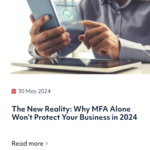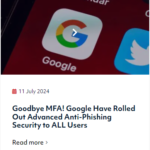

Share on social..
Phishing remains the most lethal hacking method deployed by cybercriminals to target individuals – because it’s still proving so successful for them (unfortunately for us).
Phishing was responsible for 84% of cases when a business was breached in the UK last year.
To err is human, and each and every one of us is vulnerable to making a mistake – even the experts.
The question is not only how can we reduce the risk of human error, but also, what can we do to reduce the damage when a mistake is made?
Multi-Factor Authentication (MFA) was created to bolster the security of the original username-password combination after hackers developed technology to crack most passwords.
MFA security measures include SMS/email one-time passcodes, authenticator apps, and biometric technologies like touch ID (fingerprints) and face ID on phones.
MFA should now be a non-negotiable requirement for businesses (and individuals alike). Today, basic MFA is considered a baseline security measure, and businesses that fail to implement it across all their work applications are left exceptionally vulnerable to cyber threats.
Here at Lumina, we will refuse to take on a business as a client if they refuse to implement basic MFA security.
Inevitably, hackers have evolved their methods, and there are now ways for MFA to be breached.
As a strategic IT provider who are experts in cyber security measures and risk management, we have recently been banging the drum about how vulnerable using MFA alone has become.
For more detailed information on how MFA can be breached, please see our blog:
The New Reality: Why MFA Alone Won’t Protect Your Business in 2024.

Phishing is the most successful hacking tool because it relies on human error, so cybersecurity experts at the big tech companies have been working tirelessly to create tech-based solutions to mitigate this risk.
No matter how a hacker gains access to a company’s resources, they will do so through stealing login credentials and by using their own device to begin their attacks.
So, what if we can prevent credentials from being stolen and block unauthorised devices from accessing company systems?
The great news is that phishing-resistant technology does now exist!
There are now multiple new security measures that are being rolled out by the big tech companies, and by IT providers like us as part of our PRISM Business packages.
The main one is Passkeys.
There are approximately 30 billion devices in the world today. Your system needs to know that it really is you, or anyone authorised, that is attempting to access company resources.
Passkeys can now help with this.
Passkeys are a new technology that essentially ties a login to a specific device.
They serve as digital credentials that allow access to websites or applications without the need for traditional username-password combinations, and/or MFA.
When a user chooses to set up a passkey for a website/application, two digital ‘keys’ are created. One is private and one is public, and they are then used to authenticate access.
The public key will be stored on the website/apps site, and the private key is stored on the user’s own device that was used to set the passkey up. The public key contains no sensitive data and is effectively useless without the private key.
When using a passkey to sign in to a website/app, the public key on the site must be matched with the private key on the user’s device. The technology is just checking that the two keys match – no secret authentication information is transmitted during this exchange, so no credentials can be stolen.
When a user logs into a website or an application via a username-password combination, the site compares the entered password to the copy they have stored in their database. The password that is stored by the site/app can easily be stolen if that site is compromised.
As passkeys cannot be stolen and because they tie login credentials to a specific device which stops any old device from logging into the account, this gives them a much greater level of security than the username-password combination and MFA.
Essentially, passkeys cannot be stolen via phishing.
Just last week (at the time of writing this in July 2024), Google made Passkeys available to all their users, and others will soon follow. Goodbye MFA! Google Have Rolled Out Advanced Anti-Phishing Security to ALL Users

While passkeys offer much higher levels of phishing resistance because they are tied to specific devices, there will still be some vulnerabilities because no security measure is 100% hack-proof.
Just like with the username-password combination and MFA, organised cybercrime groups with the state-backed financial resources they have behind them, will eventually find ways to overcome passkeys.
There are conversations happening amongst cybersecurity experts about the role AI and deep fakes could play in future identity theft, but right now it is too early to tell what the impact could be.
Additionally, there are also discussions about how hackers could still get around passkey logins via the usual ‘adversary-in-the-middle’ (AitM) attack to create a fake login page with the passkey option deleted, and force users to select the usual password and MFA login and steal the credentials the way they usually do. A way to combat this however would be to only use the passkey and/or any other stronger authentication option for logins (see below) and completely eliminate the need for username-passwords and MFA.
For a deeper dive into ‘adversary-in-the-middle’ (AitM) attacks and how they are carried out, please see the blog: The New Reality: Why MFA Alone Won’t Protect Your Business in 2024.
While passkeys are new and offer a much greater level of security to your [business] accounts, it must continue to be stressed that cybersecurity still requires a multi-layered approach and staff security awareness training continues to play an integral role.
As cybersecurity experts, it’s good to be excited about new technologies, but you have to do so while continuing to look over your shoulder. It will always be a cat and mouse chase between us and cybercriminals.
Although Passkeys are the new up and coming technology and they continue to be rolled out as a more effective security measure for both business and individual accounts across the web, they are just the start.
There are additional security measures that we are rolling out as part of our PRISM Business packages, to be used in conjunction with passkeys as part of a multi-layered security approach.
Check out our phishing-resistant webpage to discover what other new security measures are available in the fight against phishing attacks.